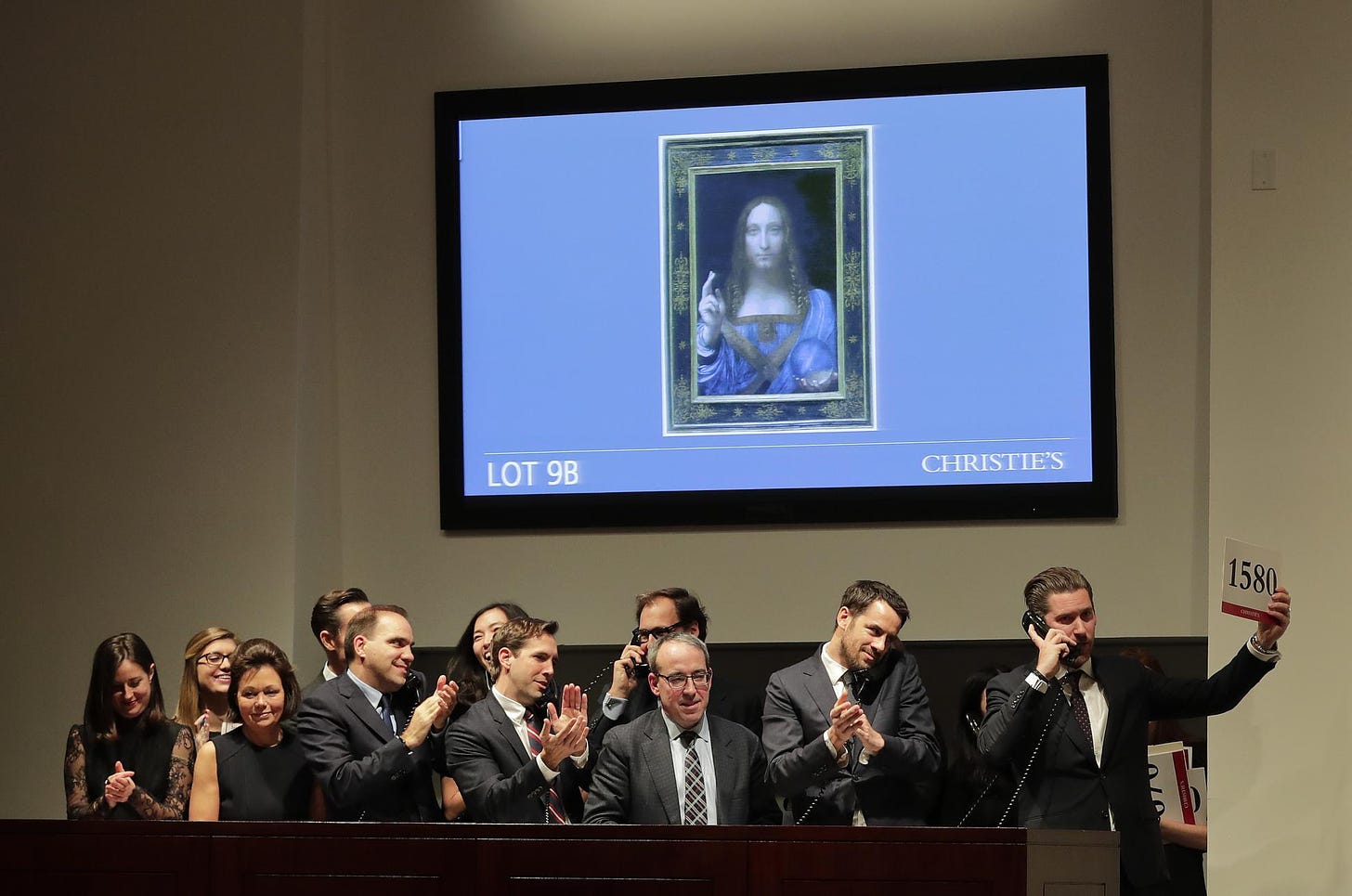Archegos
We talked a couple weeks ago about Bill Hwang and Archegos, his hedge fund that exploded in spectacular fashion last month, rocking the markets. Here is an article about how Bill Hwang lost $20 billion in two days. It’s a wild ride!
No individual has lost so much money so quickly. At its peak, Hwang’s wealth briefly eclipsed $30 billion. It’s also a peculiar one. Unlike the Wall Street stars and Nobel laureates who ran Long-Term Capital Management, which famously blew up in 1998, Hwang was largely unknown outside a small circle: fellow churchgoers and former hedge fund colleagues, as well as a handful of bankers.
It’s probably not great to go down as the guy who liquidated a fortune in 48 hours, but maybe it’s better to burn twice as bright.
However! The story doesn’t end with Archegos losing big, and being margin-called to death. When Archegos defaulted, the banks that had been loaning it the shares of stock - via “swaps” to mask the size of Archegos’s portfolio - now had all the stock sitting in their accounts, in what’s called an “unhedged” state. That means they were suddenly fully exposed to any decline in the stock’s value. Matt Levine explains:
This is bad. Mainly it is bad because banks do not want to be in the business of owning large unhedged blocks of stock.
[…]
That’s a hard thing to do. Again, if you work in prime brokerage or equity swaps at a big bank, you are just not in the business of holding billions of dollars of stock, unhedged, for long periods through huge mark-to-market losses. You have $10 billion of stock, it goes to $5 billion, you have a $5 billion mark-to-market loss, the chief executive officer calls you up and asks what on earth you think you’re doing, you say “oh it’s fine, I just found myself long $10 billion of stock and decided to hang onto it, we gotta wait for it to recover,” and the CEO instantly and publicly fires you.
And so, suddenly, a bunch of large banks found themselves sitting on a truly massive pile of unhedged stock. Sure, they’d acquired it at a discount because Archegos had paid them some money to hold it on its behalf, but now they faced an unpleasant reality - they knew there were millions of outstanding shares of these stocks sitting at other banks who had the same incentive to unload those stocks, which would send the price down, causing the very thing all the banks wanted to avoid - unhedged losses.
So, they met a couple times to discuss what on earth to do about their sudden, massive liability:
On March 25, Hwang’s prime brokers met again and discussed the possibility of standing down temporarily to let tensions ease, according to people who participated in the talks. But any attempt at solidarity proved short-lived. That day, some sent Archegos notices of default, clearing the way to sell his positions.
Credit Suisse, the bank suffering some of the worst losses on Archegos, suggested they should wait a bit before selling off:
Underscoring the chaos of an escalating situation, representatives from Credit Suisse Group AG floated a suggestion as they met [...] to confront the reality of such an exceptional margin call and consider ways to mitigate the damage: Maybe wait to see if his stocks recover?
Morgan Stanley, however, had other ideas:
But the investment bank had information it didn’t share with the stock buyers: The basket of shares it was selling, comprised of eight or so names including Baidu and Tencent Music, was merely the opening salvo of an unprecedented wave of tens of billions of dollars in sales by Morgan Stanley and other investment banks starting the very next day.
What’s particularly…amusing? about all of this was that Morgan Stanley went to its clients - a group of hedge funds - and sold a whole bunch of shares it had been previously holding for Archegos. The thing it neglected to mention was that it was the tip of the iceberg and another $45 billion was about to be sold into the market as the other banks and brokers moved to unload their shares. This would send the stock down a lot. Finance!
Anyhow, I would have loved to sit in on the call with bankers who had only recently realized they were sitting on $50 billion dollars’ worth of shares in a handful of companies. Feels like a real OK Corral moment to me. Who’s going to shoot first? Negotiate a truce? Turns out Morgan Stanley shot first, and while they may have pissed off some of their clients, can you really blame them? They had to sell, and by selling first, they screwed the other banks over, but that wasn’t their problem.
Somewhat…awkwardly, Morgan Stanley also led the secondary stock sale ViacomCBS attempted to do amidst this mess. Meaning they had some of their bankers out pitching why the stock was a great buy, while other bankers were seeking to unload billions’ worth of the stock, sending its value down. Oops!
The SEC is looking into how Archegos was never forced to file any disclosure documents and generally avoided all regulatory scrutiny for its eight-year history.
Ghost Cows
It took a while to notice, but Tyson Foods Inc. eventually realized late last year that more than 200,000 of its cattle seemed to have gone missing on a Washington state ranch.
How did this happen? Well, it turned out that a guy named Cody Easterday, owner of Easterday Ranches, racked up massive losses trading corn and cattle futures, and created phony invoices to send to Tyson Foods to cover them. He claimed to have bought 200,000 cattle to produce meat for Tyson, but he…just didn’t:
The arrangement came tumbling down in late 2020, when Tyson discovered that Easterday’s books -- as well as its own -- were “significantly in error,” Tyson said in a lawsuit targeting the ranch.
I’d say so! I am curious how it went on for so long without Tyson noticing - I am not a rancher, but 200,000 cows’ worth of meat seems like a tricky thing to cover up after awhile? That’s 200 million pounds of beef! If only Easterday had shipped Tyson a bunch of fake cows.
Salvator Mundi
You know I cannot resist a good art fraud story. For those not familiar, the world’s most expensive painting - $450 million dollars - is…I wouldn’t call it a fake, but at the time of sale it was falsely attributed to Leonardo da Vinci. Experts believe it was painted by an assistant in his studio. In fact, the story of how it fetched such a massive price is extremely funny in a don’t-think-too-hard-about-the-wealth-involved sort of way:
Two Arab princes accidentally cost themselves $450 million in an anonymous bidding war over a Da Vinci painting - because each thought the other was their rival Qatar, according to palace sources.
Initially they tried to cover it up by having Mohammed Bin Salman swap it with the Emiratis for a yacht - as one does - and the UAE was going to display it in the Louvre Abu Dhabi. In 2018 the museum unexpectedly cancelled the painting’s unveiling, and it disappeared for awhile, before being spotted on MBS’s yacht in 2019. So what happened?
It turned out that during the preparations to display the painting in a museum, Louvre experts determined it was not a da Vinci, and intended to publish their findings, so the UAE yanked it to prevent the information becoming public.
However! A new documentary alleges that behind the scenes, the Saudi prince was pressuring the French government to display the Mundi next to the Mona Lisa and present it as an authentic da Vinci:
Ultimately, President Emmanuel Macron rejected Saudi demands and the French museum never exhibited the painting. The incident has reportedly caused a minor diplomatic riff between France and Saudi Arabia.
Uh huh. For the time being, MBS will have to keep the Mundi on his yacht, presumably insisting to guests it’s authentic and making party conversation awkward.
WinRed
After I wrote about WinRed and Facebook last week, I reached out to a few journalists I know, hoping we could put some pressure on Facebook to review their policies and force WinRed to stop enabling the GOP to scam money from its donors. Judd Legum at Popular Info wrote about it, and reached out to Facebook, and their response was…about what you’d expect:
Facebook, however, said that Section 6 does not apply to political ads that solicit donations. "Pre-checked boxes do not violate our policies for political fundraising," Facebook spokesperson Liz Bourgeois told Popular Information, "We’re taking a close look at how this fundraising practice is used on our platform to ensure that we protect the people using our services."
How convenient! These policies are not listed anywhere I can find them on Facebook’s website, so I can only assume they live in Joel Kaplan’s head and selectively apply to his cronies in the GOP. WinRed is still using these highly aggressive advertising and fundraising tactics, and we have no idea when or if it’ll ever catch up to them.
SoHo Grifter
Anna Sorkin, a Russian national who posed as a German heiress and scammed banks, people, and businesses of $275,000, has been released from jail and has some thoughts on the US criminal justice system:
"I feel like it's insane. To take people, to lock them up, take everything away from them, and just to expect them to reform. What is that supposed to do for you? You're just deprived of everything. The same solution for everyone, no matter what you've done? When you're a criminal, it's such a different mindset, whether you kill someone, or if you sell drugs. The place where you're coming from is not comparable. They have this universal solution for everyone, and that should not be the case."
I…agree with her? Putting someone in prison for 4 to 12 years for swindling some money is very harsh. Though! Sorkin cut a deal with Netflix, and was able to use that money to pay off her debts. It almost had a happy ending, except now she’s in ICE custody and they’re going to deport her:
However, she had overstayed her visa by the time the trial took place, and ICE had vowed to deport her.
Ah well. She’s still got a book, NFT project, and merch to fall back on. And Shonda Rhimes is making a show about her! She also says she’s working on prison reform, which seems like a much better use of her unique skillset.
Archer Aviation
In case you weren’t aware of the sheer volume of VC money sloshing around the markets right now - meet Archer Aviation. The company was supposed to be making electric-powered aircraft to be used as flying taxis - not a thing, yet - and had “no meaningful operations as of January 2020.” Now it’s worth $3.8 billion dollars and says it will have an aircraft ready within months. Huh! What happened?
Wisk, a joint venture of Boeing Co. and Google co-founder Larry Page’s Kitty Hawk Corp., said former employees downloaded thousands of files and secret designs before taking jobs at Archer, according to a complaint filed Tuesday in federal court in San Jose, California.
[…]
The reason for Archer’s rapid development became “more self-evident as it began revealing designs of its aircraft,” including a rendering that resembled one from Wisk’s confidential patent application in January 2020, the suit alleged.
Oh, well that makes sense. Archer hired 20 former Wisk employees - 10 within the same week - some of whom downloaded a bunch of design files to bring with them. Not a great look! I wonder if that was part of the pitch deck Archer used when it went out and got billions in investor cash. I haven’t had a chance to write more about SPACs because the news has been a bit nuts, but this lack of oversight is what gives us companies like Nikola - which is still clinging to life, somehow - and Archer.
Also, flying taxis?? These EV companies can’t even get self driving right and we’re going to let them fly us around cities? I think I’ll pass.
Short Cons
NY Mag - “For all the ways that this particular moment in the history of markets feels strangely futuristic — computer dollars buying cyberart on the digital marketplace! — the basic dynamic at work here is a recognizable one. There are a lot of suckers who want to get rich fast without much work.”
WSJ - “At least 30 lawsuits related to natural-gas contracts have been filed in four states since the February storm that knocked out power for millions of Texans and sent gas prices soaring to their highest levels in years. Billions of dollars are collectively on the line.”
In These Times - “Beginning in October of last year, the company instituted a new policy for all of its freelancers and independent contractors — they are now required to pay a fee of 2.2% every time they file an invoice through the company’s invoicing system, called Fieldglass.”
Tips, thoughts, or Netflix deals to scammerdarkly@gmail.com




